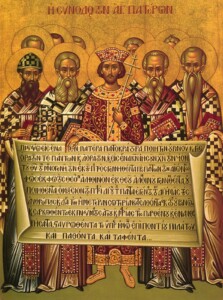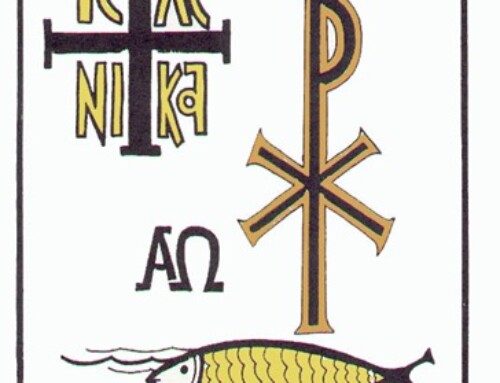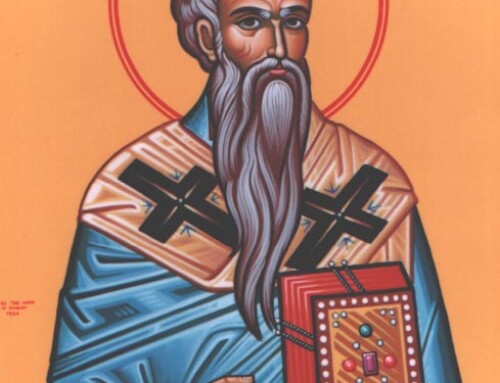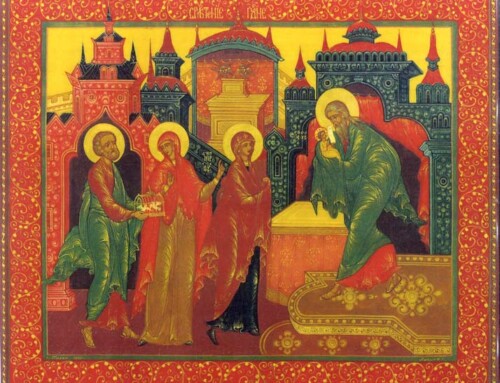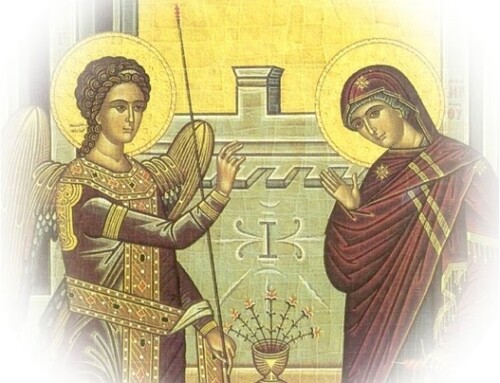In the Name of the Father and of the Son and of the Holy Spirit. At the beginning of the fourth century, to be precise, in the Year 325, when persecution of Orthodox Christianity had largely ceased, was held the first Universal Council of the Church. 318 Bishops gathered together from all over the Orthodox Christian world. Together they drew up a written summary of the Orthodox Faith, which was confirmed later in the same century at the Second Universal Council of the Church. We still sing and read that written summary of our Faith, drawn up all those years ago. It is known in English as the ‘Creed’. This word comes from the Latin for ‘I believe’. The Creed is that text which we read every morning at morning prayers and that which we sing at every Divine Liturgy, beginning: ‘I believe in One God the Father Almighty, Maker of Heaven and Earth…’. All over the world the Orthodox Church upholds this same Creed and has done so ever since the First Universal Council of the Church. Even Roman Catholicism and Anglicanism still retain most of that Creed, though with one significant alteration. The different clauses of the Creed can be divided into four basic sections: Firstly, the beginning of the Creed where we affirm our belief in ‘One God the Father…’.Secondly, the part where we affirm our belief in ‘One Lord Jesus Christ, the Son of God…’.Thirdly, where we affirm our belief in ‘The Holy Spirit, the Lord, the Giver of Life, Who proceeds from the Father…’.Finally, where we affirm our belief in ‘One, Holy, Catholic and Apostolic Church, in one baptism, in the resurrection, and in the age to come. On account of pride and delusion, certain individuals and societies in each succeeding age of human history have rejected in turn one or more of these parts of the Creed.
Thus, for the first three centuries, the Church was viciously persecuted by the forces of the world which rejected the Faith in One God the Father. They maintained that there were many gods, that the sun was a god, that the moon was a god, that there was a wind god or a rain god, that the Roman Emperor was a god and so on. These forces were defeated by the sacrificial blood of hundreds of thousands of Orthodox martyrs.
Then, during the following centuries, the Church was persecuted by those who maintained that Christ was not the Son of God, or that he was the Son of God, but had never become a real man. These groups gave themselves various names: Arians, Nestorians, Monophysites, Iconoclasts and so on. The Church was victorious too against these groups and maintained the Faith through the sacrifices of the faithful upheld by the grace of God.
Then, again for hundreds of years, the Church was persecuted by those who rejected the Fathers’ teaching on the Holy Spirit. This was when Roman Catholicism was founded, which then later fragmented into hundreds of different groups and sects, which only had one thing in common: they all reject the confession of the Holy Spirit of the Creed of the First Universal Council of the Orthodox Church.
Finally, and more recently, evil forces have rejected the Orthodox teaching on the Church, they have denied that there is only one baptism and that after the separation of the soul from the body there is resurrection and an age to come. Thus in our own times, there are many such people who deny that there is life after death.
The Fathers of the First Universal Council were then also Prophets, for they forestalled much later errors and neatly defined the Faith for all time, confirming it at the Second Universal Council. This is why, after the fourth century, no other Council of the Church ever redefined the Faith or changed or modified anything. The Creed remains ever the same. That is why for centuries no Universal Council has been called: the work was all done early on.
The Fathers of the First Council were, however, most directly concerned with the question of the Divinity of Christ. They firmly maintained that Christ is the Son of God. They were opposed by a particularly arrogant intellectual, a priest who was called Arius. We do not know the unfortunate Bishop who ordained him, but it was a very bad choice. Arius in his overweening pride asserted that Christ was not the Son of God. At one session of the Council St Nicholas, who like many other famous saints was present, stood up and slapped Arius across the face in order to stop him from blaspheming, So wicked were Arius’ words that St Nicholas, a man of great love, wanted to protect him from his own foolishness so that he would not be struck down and might come by shock to see reason.
At the First Universal Council, the Fathers were triumphant in the expression of the Truth, ‘the great Mystery of Orthodoxy’, that Christ is the Son of God, True God. Arius and his devotees were defeated.
Why do we commemorate the Fathers of the First Council today?
We are now three days after the Feast of the Ascension and seven days before Pentecost. These Feasts prove the Divinity of Christ. That is why today we have read from St John’s Gospel where Our Lord speaks of His Father, He speaks as His Son, Whom the Father has sent, saying that He came out from the Father and that all things that are the Father’s are also the Son’s. These Gospel words prove the Divinity of the Son. It is these very words of Our Lord faithfully recorded in the Gospel that inspired the Fathers of the First Universal Council.
For if Christ is not Divine, if He is not the Son of God, then the whole Faith is worthless. All stands or falls by this. He who denies the Divinity of Christ is but one step from atheism and all its horrors which so marred the last century. Yet it is this error, to say that Christ is not the Son of God, which is as widespread today as it was in the fourth century. Go into the streets and ask who Christ is. People will tell you at best: ‘Oh, a great man’. ‘A wise man’. But few will tell you that He is the Son of God. Indeed there are whole groups who call themselves Christians where the majority do not believe that Christ is the Son of God. For example, there is one group called Jehovah’s Witnesses. They do not believe that Christ is the Son of God. Ask them.
But we believe, as all the Holy Fathers believe, that Christ is True God and also a real man.
Only a sinless, perfect man, living and walking on earth among men, could show humanity that it is possible to avoid the sin and death which distract us from becoming what we were intended to be – holy unto all eternity.
Only the True God become incarnate as man could save humanity by showing him the measure of his potential – to become godlike through humility.
Only the Son of God could say to us: ‘Be ye perfect as is my Father in Heaven’.
This is the meaning of today’s Feast: Christ is God and through his Body, the Church, He opens up to us the path to God, the path to holiness, the path to perfection.
It is for us to make use of this through leading an Orthodox Christian way of life and thus save our souls.
Holy Fathers of the First Council, Pray to God for us!
Amen.
http://www.orthodoxengland.org.uk/sermf1ec.htm

